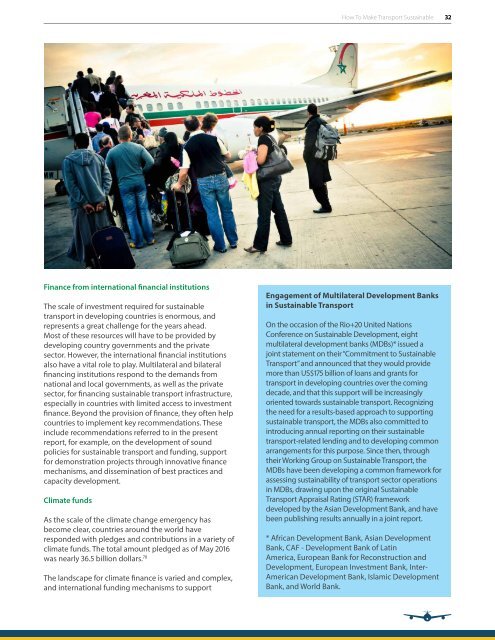MOBILIZING DEVELOPMENT
a5OQ306q56U
a5OQ306q56U
Create successful ePaper yourself
Turn your PDF publications into a flip-book with our unique Google optimized e-Paper software.
How To Make Transport Sustainable 32<br />
Finance from international financial institutions<br />
The scale of investment required for sustainable<br />
transport in developing countries is enormous, and<br />
represents a great challenge for the years ahead.<br />
Most of these resources will have to be provided by<br />
developing country governments and the private<br />
sector. However, the international financial institutions<br />
also have a vital role to play. Multilateral and bilateral<br />
financing institutions respond to the demands from<br />
national and local governments, as well as the private<br />
sector, for financing sustainable transport infrastructure,<br />
especially in countries with limited access to investment<br />
finance. Beyond the provision of finance, they often help<br />
countries to implement key recommendations. These<br />
include recommendations referred to in the present<br />
report, for example, on the development of sound<br />
policies for sustainable transport and funding, support<br />
for demonstration projects through innovative finance<br />
mechanisms, and dissemination of best practices and<br />
capacity development.<br />
Climate funds<br />
As the scale of the climate change emergency has<br />
become clear, countries around the world have<br />
responded with pledges and contributions in a variety of<br />
climate funds. The total amount pledged as of May 2016<br />
was nearly 36.5 billion dollars. 70<br />
The landscape for climate finance is varied and complex,<br />
and international funding mechanisms to support<br />
Engagement of Multilateral Development Banks<br />
in Sustainable Transport<br />
On the occasion of the Rio+20 United Nations<br />
Conference on Sustainable Development, eight<br />
multilateral development banks (MDBs)* issued a<br />
joint statement on their “Commitment to Sustainable<br />
Transport” and announced that they would provide<br />
more than US$175 billion of loans and grants for<br />
transport in developing countries over the coming<br />
decade, and that this support will be increasingly<br />
oriented towards sustainable transport. Recognizing<br />
the need for a results-based approach to supporting<br />
sustainable transport, the MDBs also committed to<br />
introducing annual reporting on their sustainable<br />
transport-related lending and to developing common<br />
arrangements for this purpose. Since then, through<br />
their Working Group on Sustainable Transport, the<br />
MDBs have been developing a common framework for<br />
assessing sustainability of transport sector operations<br />
in MDBs, drawing upon the original Sustainable<br />
Transport Appraisal Rating (STAR) framework<br />
developed by the Asian Development Bank, and have<br />
been publishing results annually in a joint report.<br />
* African Development Bank, Asian Development<br />
Bank, CAF - Development Bank of Latin<br />
America, European Bank for Reconstruction and<br />
Development, European Investment Bank, Inter-<br />
American Development Bank, Islamic Development<br />
Bank, and World Bank.


